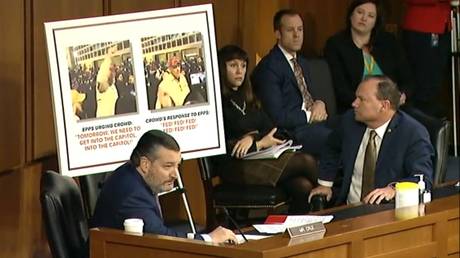
Ray Epps, a protester who disappeared from the FBI’s January 6 most wanted list, told Congress he “has never been an informant”
After GOP senators received non-answers from DOJ officials about a January 6 protester who was spared prosecution, the Democrat-dominated special committee assured the public that Ray Epps was not a fed.
The Arizona man, who was filmed on January 5 and 6 last year apparently riling up pro-Trump protesters in Washington, DC, was interviewed by the House committee investigating the Capitol Hill riot, its Twitter account said.
“Epps informed us that he was not employed by, working with, or acting at the direction of any law enforcement agency on Jan 5th or 6th or at any other time, & that he has never been an informant for the FBI or any other law enforcement agency,” the tweet said.
The post came hours after Epps’ role in the dramatic events of January 2021 was brought to the forefront of a hearing of the Senate Judiciary Committee, which on Monday heard from senior Department of Justice (DOJ) officials about the threat of domestic terrorism post-January 6.
The witnesses interviewed were Assistant Attorney General Matthew Olsen and Executive Assistant Director of the FBI Jill Sanborn. Both officials were grilled by GOP Senators Tom Cotton and Ted Cruz on the possible roles played by individuals associated with federal law enforcement and particularly about Epps.
Senator Cruz prepared visual props showing the protester’s recorded activities ahead of the storming of the Capitol building. He bombarded Sanborn with questions such as: “Was Ray Epps a fed?” The senator also asked why Epps was never charged with any crimes and even “magically disappeared from” the list of people the FBI was investigating in connection with the January 6 violence.
Most of Sanborn’s responses were “I cannot answer that question,” though in the end, she said that to her knowledge, no FBI agents or informants encouraged “violent and criminal conduct” at the Capitol.
Olsen was likewise uninformative regarding the FBI’s loss of interest in Epps, telling Senator Cotton that he didn’t have “any information about that individual,” and referring him to his fellow witness. The answer came on the back of several other “I don’t know” responses, prompting Cotton to chastise Olsen for apparently coming to the hearing unprepared.
Epps’ role in the events of January 2021 was known since the early days of the investigation, but the suspicion that he was a fed-linked inciter of violence has brewed since around mid-June. Later, he was somehow removed from the FBI’s Capitol Violence Most Wanted List.
In October, Republican Representative Thomas Massie used footage of Epps when he questioned Attorney General Merrick Garland about whether federal agents had a hand in encouraging the January 6 riot.
The theory was further popularized by conservative outlet Revolver, which published a lengthy argument for why it believed the former leader of the Arizona chapter of the Oath Keepers to be protected by the feds.
The government never explained why Epps was never charged with any crime. There appears to be no evidence that he personally entered the Capitol building after police barricades around it were broken, or took part in street violence after the breach.
The involvement of an FBI informant in the riot was separately reported in September by the New York Times. The newspaper said a member of the Proud Boys organization was in touch with his FBI handler on January 6 and that his messages undermined the federal government’s case against other members, who were charged with planning an assault on the Capitol building with the goal of disrupting the certification of Joe Biden as president-elect. The Times report did not claim that the informant was in any way inciting violence.




